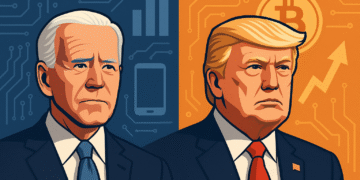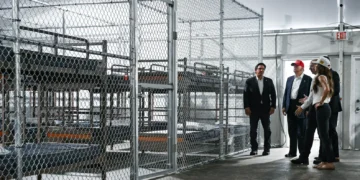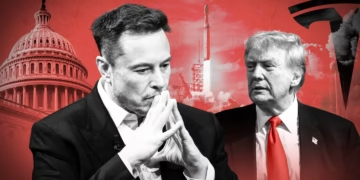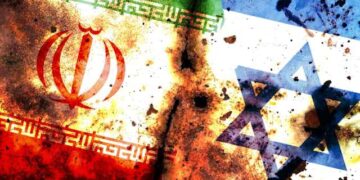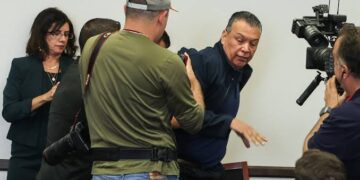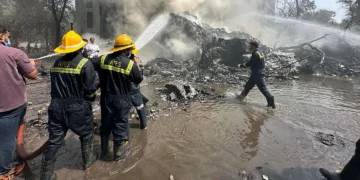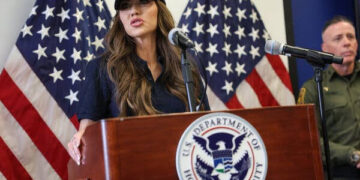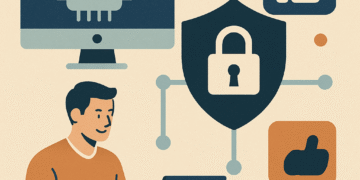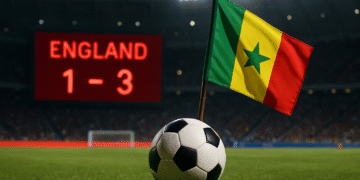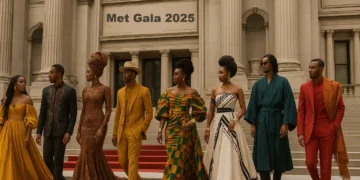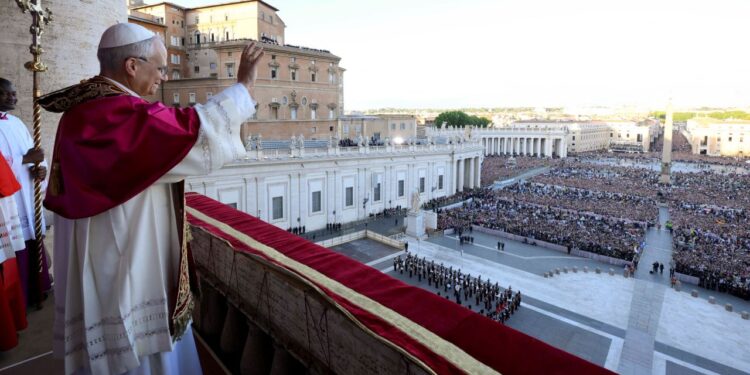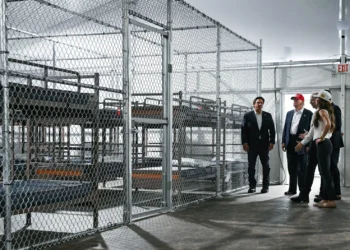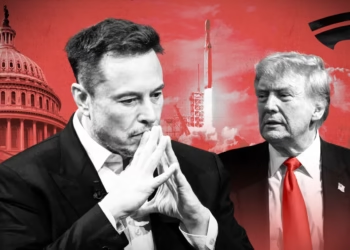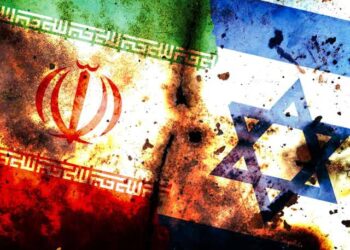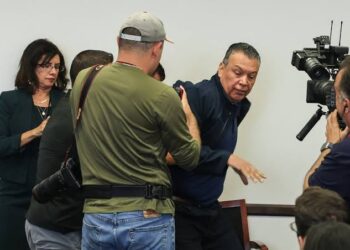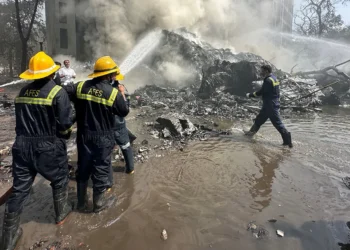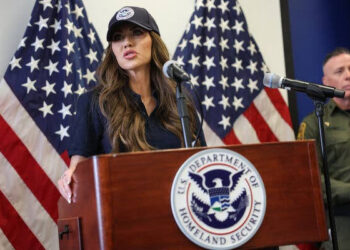The Catholic Church has witnessed a historic moment with the election of Cardinal Robert Prevost as the new Pope, marking a significant milestone as he becomes the first American pontiff. This unprecedented event has sent shockwaves of excitement and curiosity worldwide.

The selection of Prevost as Pope Leo XIV is not only a remarkable honor for the American Catholic community but also a pivotal moment in the Church’s history. This change in leadership is expected to bring about new perspectives and approaches.
Key Takeaways
- The election of Cardinal Robert Prevost as Pope marks a historic first for the United States.
- Pope Leo XIV brings a new era of leadership to the Catholic Church.
- This change is anticipated to have significant implications for the Church globally.
- The new Pope’s background and previous roles will likely influence his papacy.
- The reaction from the global Catholic community is one of intrigue and anticipation.
Breaking News: White Smoke Signals Historic Election
The moment of truth arrived when white smoke rose above the Vatican, announcing the election of Cardinal Robert Prevost as Pope Leo XIV. This historic event marked a significant milestone in the Catholic Church’s history, as Cardinal Robert Prevost became the first American to be elected pope.
The excitement was palpable as the news spread like wildfire. The white smoke, a traditional sign of a successful papal election, billowed from the Sistine Chapel, signaling a new era for the Church.
The Moment of Announcement at the Vatican
At the Vatican, the announcement was met with great anticipation. As the white smoke appeared, the cardinals inside the Sistine Chapel knew that a new pope had been elected. The moment was historic, marking a new chapter in the Church’s legacy.
First Reactions from St. Peter’s Square
In St. Peter’s Square, the crowd was electric with excitement. As the news of the white smoke spread, the atmosphere became increasingly festive. People began to cheer and chant, welcoming the new pope, Pope Leo XIV.
| Event | Location | Significance |
|---|---|---|
| White smoke signals papal election | Sistine Chapel, Vatican | Tradition indicating a new pope has been elected |
| Cardinal Robert Prevost elected | Vatican | First American to be elected pope |
| Crowd’s reaction | St. Peter’s Square | Festive atmosphere, welcoming the new pope |
Cardinal Robert Prevost Pope Leo XIV: A Historic First for America
Cardinal Robert Prevost has made history by becoming the first American Pope, Leo XIV. This significant event marks a new chapter in the Catholic Church, breaking centuries of tradition.
Breaking the European Tradition
For centuries, the Catholic Church has been led by Popes from Europe. The election of Cardinal Prevost as Pope Leo XIV signals a shift in this tradition, bringing a fresh perspective to the Vatican. This change is expected to have far-reaching implications for the Church’s global presence and its relationship with Catholics worldwide.

Immediate Global Reactions to the First American Pope
The news of Cardinal Prevost’s election has sparked a mix of reactions globally. Catholics and non-Catholics alike are taking to social media to share their thoughts and congratulations. From the streets of Rome to the cities of America, people are discussing the potential impact of this historic election.
The global Catholic community is abuzz with excitement and curiosity about what this change means for the future of the Church.
Who is Robert Francis Prevost?
Born and raised in Chicago, Robert Prevost’s journey to the papacy is a story of faith, perseverance, and global experience. As the newly elected Pope Leo XIV, his background has prepared him for the challenges and opportunities that lie ahead.
Early Life and Education in Chicago
Robert Francis Prevost was born in Chicago, where he spent his formative years. His early life was marked by a strong Catholic upbringing, which laid the foundation for his future vocation. Prevost’s education in Chicago’s institutions further solidified his resolve to serve the Church. His experiences in Chicago shaped his perspective and commitment to his faith.
Joining the Augustinian Order
A significant turning point in Prevost’s life came when he joined the Augustinian Order. This decision reflected his deepening commitment to a life of service and spirituality. The Augustinian Order, known for its emphasis on education and pastoral care, provided Prevost with a rich spiritual and intellectual foundation. His membership in the Order has been instrumental in shaping his approach to religious leadership.
Connection to Villanova University
Prevost’s connection to Villanova University, an Augustinian institution, highlights his ongoing relationship with educational institutions that share his Order’s values. Villanova University has been a significant part of Prevost’s journey, reflecting his commitment to education and the Augustinian tradition. The university’s emphasis on Augustinian values has aligned with Prevost’s own spiritual and pastoral approach.
| Aspect | Description | Significance |
|---|---|---|
| Early Life | Born and raised in Chicago | Strong Catholic upbringing |
| Augustinian Order | Joined the Order | Deepened commitment to service and spirituality |
| Villanova University | Connection to the university | Reflection of commitment to Augustinian values and education |
A Life of Service: Prevost’s Journey to the Papacy
Cardinal Robert Prevost’s path to becoming Pope Leo XIV was paved with years of dedicated service and missionary work. His journey to the papacy is marked by significant experiences that have shaped his global perspective and leadership skills.
Missionary Work in South America
Prevost spent much of his early career as a missionary in South America, where he developed a deep understanding of the local cultures and needs. This experience not only broadened his perspective but also instilled in him a commitment to serving the global church.
Impact in Peru and Latin America
His missionary work in Peru had a lasting impact on the local communities, fostering growth and development. Prevost’s efforts in Latin America helped build stronger, more resilient communities.
Developing a Global Perspective
Through his work in South America, Prevost developed a global perspective, understanding the diverse needs and challenges faced by different regions of the church. This broadened his approach to leadership.
Leadership as Bishop in Peru
Prevost’s leadership as Bishop in Peru was marked by his ability to connect with local communities and address their needs effectively. His tenure was characterized by efforts to strengthen the church’s presence in the region.
Role in Vatican’s Dicastery for Bishops
Later in his career, Prevost played a significant role in the Vatican’s Dicastery for Bishops, where he contributed to the global governance of the church. His experience in this role prepared him for the complexities of papal leadership.
| Milestone | Location | Significance |
|---|---|---|
| Missionary Work | South America | Developed global perspective |
| Bishop in Peru | Peru | Leadership experience |
| Dicastery for Bishops | Vatican | Global governance experience |

Inside the Conclave: How Pope Leo XIV Was Elected
The conclave that elected Pope Leo XIV was a culmination of a complex process involving 133 cardinal electors. This gathering of cardinals in the Sistine Chapel is a centuries-old tradition that is both a fascinating and mysterious process.
The 133 Cardinal Electors and Two-Thirds Majority Requirement
The election process requires a two-thirds majority vote among the cardinal electors. With 133 cardinals participating, the candidate needed to secure 89 votes to be elected as the new pope. This requirement ensures that the elected pope has a broad base of support among the cardinals.
The Significance of White Smoke
After several rounds of voting, the cardinals ultimately chose Cardinal Robert Prevost as the new pope. The announcement of his election was signaled by white smoke emanating from the Sistine Chapel, a tradition that dates back centuries. The white smoke is a symbol of the successful election of a new pope.
Factors That Influenced the Final Decision
Several factors likely influenced the final decision of the cardinal electors. These include the candidate’s past experience, theological stance, and ability to lead the Catholic Church in a rapidly changing world. Cardinal Prevost’s experience as a bishop and his role in the Vatican’s Dicastery for Bishops were likely significant factors in his election.
First Words as Pope: Leo XIV Addresses the World
From the balcony of St. Peter’s Basilica, Pope Leo XIV delivered his first words as Pope, echoing a call for peace. This moment marked the beginning of his papacy, a significant event in the Catholic Church’s history.
Key Messages from the Balcony of St. Peter’s Basilica
Pope Leo XIV’s address was characterized by its emphasis on unity and compassion. He called for global solidarity, urging Catholics and people of goodwill to work together for the common good. The Pope’s message was delivered in multiple languages, highlighting his commitment to a universal Church.

Call for Peace and Tribute to Pope Francis
In his address, Pope Leo XIV also paid a heartfelt tribute to his predecessor, Pope Francis. He acknowledged the significant contributions Pope Francis made during his tenure, particularly in promoting dialogue and understanding within the Church and beyond. The new Pope emphasized the importance of continuing Pope Francis’ legacy, especially in areas such as environmental stewardship and social justice.
| Key Themes | Description |
|---|---|
| Call for Peace | Pope Leo XIV urged global peace and unity, calling for an end to conflicts and promoting understanding among nations. |
| Tribute to Pope Francis | The new Pope paid tribute to his predecessor, acknowledging his contributions to the Church and the world. |
| Continuity and Change | Pope Leo XIV signaled his intention to build upon the foundations laid by Pope Francis while charting a new course for the Church. |
The Significance of Choosing the Name “Leo XIV”
The newly elected Pope Leo XIV has sent shockwaves across the globe with his papal name choice. This decision is not just a matter of personal preference but carries significant historical and symbolic weight.
Historical Legacy of Previous Pope Leos
The name “Leo” has been associated with several significant figures in Catholic Church history. Understanding the legacy of these popes can provide insights into the potential direction of Pope Leo XIV’s papacy.
Leo XIII’s Social Justice Legacy
One of the most notable Pope Leos was Leo XIII, known for his groundbreaking encyclical Rerum Novarum, which addressed social justice issues and the rights of workers. His commitment to social justice continues to influence the Church’s stance on labor rights and economic inequality.
Other Notable Pope Leos in History
Other Pope Leos, such as Leo I and Leo III, played crucial roles in shaping Church doctrine and politics. Leo I, for instance, was instrumental in asserting the authority of the Bishop of Rome.
What This Name Choice Signals About His Papacy
By choosing the name “Leo XIV,” Pope Leo XIV signals his intention to continue the legacy of his predecessors, particularly in areas such as social justice. As
“The choice of name is a programmatic choice, indicating the direction he wants to give to his pontificate.”
This choice reflects a commitment to the values and principles upheld by previous Pope Leos, potentially indicating a focus on social justice and Church doctrine during his papacy.
Continuing Pope Francis’ Legacy: Expected Reforms and Policies
With Pope Leo XIV at the helm, the Catholic Church is poised to navigate a path that balances continuity with innovation in its reform journey. As the first American Pope, Leo XIV brings a fresh perspective to the Vatican, sparking both anticipation and curiosity about the future of the Church’s reforms.
Areas of Likely Continuity in Church Reform
Pope Francis’ legacy has been marked by significant efforts to modernize the Church, including a greater emphasis on social justice and environmental stewardship. It is expected that Pope Leo XIV will continue on this trajectory, potentially deepening the Church’s commitment to these causes. The ongoing synodal process, initiated by Pope Francis, is likely to remain a priority, ensuring that the Church remains inclusive and responsive to the needs of its global community.

Potential New Directions Under American Leadership
Under Pope Leo XIV’s American leadership, the Church may witness a shift towards greater transparency and accountability, reflecting the cultural values of his homeland. As “the first American Pope”, Leo XIV may leverage his unique position to foster stronger ties between the Vatican and the Catholic Church in the United States, potentially influencing the global Church’s approach to issues like clergy accountability and lay participation.
As the Church embarks on this new chapter, it is clear that Pope Leo XIV’s papacy will be characterized by both the continuation of Pope Francis’ reforms and the introduction of new perspectives shaped by his American background.
“The future of the Catholic Church is not just about maintaining tradition, but about embracing change and guiding the faithful through the complexities of the modern world.”
Reactions from American Catholics and Church Leaders
The news of Cardinal Robert Prevost’s election as Pope Leo XIV has been met with jubilation from church leaders and American Catholics alike. This historic moment marks a significant shift in the Catholic Church’s global landscape.
Celebrations in Chicago and Across the US
In Chicago, where Cardinal Prevost has roots, the community is ecstatic. “This is a momentous day for American Catholics,” said a spokesperson for the Archdiocese of Chicago. Cities across the United States are hosting vigils and prayer services to celebrate this unprecedented achievement.
Statements from US Bishops and Catholic Organizations
US bishops have issued statements congratulating Pope Leo XIV on his election. The United States Conference of Catholic Bishops released a statement expressing their “joy and support” for the new Pope. Catholic organizations across the country have also welcomed the news, highlighting the significance of this moment for the American Catholic community.
The reaction from American Catholics and church leaders underscores the excitement and anticipation surrounding Pope Leo XIV’s papacy. As the first American Pope, he brings a fresh perspective to the Vatican, and many are eager to see the impact of his leadership.
Global Implications of an American Pope
The ascension of an American Pope to the papacy is set to have far-reaching implications for the Catholic Church worldwide. As the first American to hold this position, Pope Leo XIV brings a new dynamic to the Vatican’s global influence.
Shifting the Church’s Center of Gravity
The election of Pope Leo XIV signifies a potential shift in the Church’s center of gravity. Historically, the Catholic Church has been dominated by European perspectives. However, with an American at the helm, there may be a more pronounced focus on the perspectives and challenges faced by the Church in the Americas.
- Increased representation for American Catholics
- Potential for new theological perspectives
- Greater emphasis on Church issues relevant to the Americas
Potential Impact on Vatican-US Relations
Pope Leo XIV’s papacy could also have significant implications for Vatican-US relations. An American Pope may facilitate stronger diplomatic ties between the Vatican and the United States, potentially influencing areas such as:
- International humanitarian efforts
- Interfaith dialogue
- Global economic policies
As the global Catholic community adjusts to this new chapter, the world watches with interest to see how Pope Leo XIV will navigate these complex relationships and shape the future of the Catholic Church.
Challenges Facing the New Pontiff
As Pope Leo XIV embarks on his papacy, he faces a myriad of challenges that will test his leadership and vision for the Catholic Church. The new pontiff must address pressing internal issues while also providing global leadership on critical crises.
Internal Church Issues
The Catholic Church is grappling with several internal challenges that require immediate attention. These include clergy shortages, ongoing doctrinal debates, and the need for church governance reform.
Addressing Clergy Shortages
The decline in clergy numbers is a significant concern, affecting the Church’s ability to serve its followers effectively. Pope Leo XIV must explore innovative solutions, such as enhancing priestly formation programs and potentially re-examining clerical celibacy.
Navigating Doctrinal Debates
Doctrinal debates continue to be a contentious issue within the Church. The new pope will need to balance tradition with modernity, ensuring that the Church remains relevant while adhering to its core teachings.
Church Governance Reform
Reforming church governance is crucial for improving transparency and accountability. Pope Leo XIV may need to implement structural reforms to enhance the Church’s administrative efficiency.
Global Crises Requiring Papal Leadership
Beyond internal issues, Pope Leo XIV is also expected to provide leadership on several global crises. These include promoting peace initiatives in conflict zones, addressing climate change, and advocating for economic equality and social justice.
Peace Initiatives in Conflict Zones
The pope’s role in promoting peace is critical. Through diplomatic efforts and public advocacy, Pope Leo XIV can help mitigate conflicts and promote dialogue.
Climate Change and Environmental Stewardship
As a moral leader, Pope Leo XIV is well-positioned to emphasize the importance of environmental stewardship. He can encourage sustainable practices among Catholics worldwide.
Economic Inequality and Social Justice
Addressing economic inequality is another key area where the pope can exert significant influence. By advocating for social justice, Pope Leo XIV can help address the root causes of poverty and inequality.
Conclusion: A New Chapter in Catholic Church History
The election of Cardinal Robert Prevost as Pope Leo XIV marks a significant milestone in Catholic Church history, ushering in a new chapter under American leadership. This historic event not only breaks the European tradition of papal succession but also brings a fresh perspective to the Vatican.
As the first American Pope, Leo XIV is poised to address the challenges facing the Catholic Church, from internal reforms to global crises. His papacy is expected to continue the legacy of Pope Francis while potentially introducing new directions influenced by his American background and pastoral experience.
The significance of Pope Leo XIV’s election extends beyond the Catholic community, resonating with people around the world. As the Church navigates complex global issues, the leadership of Pope Leo XIV is likely to play a crucial role in shaping its future. This new chapter in Catholic Church history is a momentous occasion, filled with possibilities for growth, dialogue, and service.
FAQ
Who is the new Pope?
The new Pope is Cardinal Robert Francis Prevost, who has taken the name Pope Leo XIV.
Is Pope Leo XIV the first American Pope?
Yes, Pope Leo XIV is the first American to be elected as Pope in the history of the Catholic Church.
Where is Pope Leo XIV from?
Pope Leo XIV is from Chicago, Illinois, in the United States.
What was Pope Leo XIV’s background before becoming Pope?
Before becoming Pope, Cardinal Robert Francis Prevost was a member of the Augustinian Order, served as a missionary in South America, and was the bishop in Peru.
Why did Cardinal Prevost choose the name Leo XIV?
The choice of the name Leo XIV is significant as it connects to the legacy of previous Popes named Leo, including Leo XIII, known for his social justice initiatives.
How old is Pope Leo XIV?
Pope Leo XIV is 69 years old.
What are the expectations from Pope Leo XIV’s papacy?
Pope Leo XIV is expected to continue the reforms initiated by his predecessor, Pope Francis, and potentially introduce new directions under his American leadership.
How was Pope Leo XIV elected?
Pope Leo XIV was elected through a conclave of 133 cardinal electors, who required a two-thirds majority vote to select the next Pope.
What was Pope Leo XIV’s first address to the world about?
In his first address from the balcony of St. Peter’s Basilica, Pope Leo XIV called for peace and paid tribute to the late Pope Francis.
What are the global implications of having an American Pope?
The election of an American Pope could potentially shift the Church’s center of gravity and impact Vatican-US relations.
What challenges is Pope Leo XIV expected to face?
Pope Leo XIV is expected to face internal Church issues such as clergy shortages and doctrinal debates, as well as global crises including peace initiatives in conflict zones, climate change, and economic inequality.



